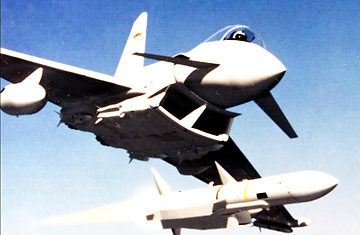
Artist impression of a Eurofighter Typhoon, part manufactured by BAE Systems.
As Europe's biggest weapons maker, BAE Systems is used to mounting a defense. But the British firm may soon face its toughest fight yet. Britain's Serious Fraud Office (SFO) said Thursday it plans to prosecute BAE over allegations — consistently denied by the company — that the company paid millions of dollars in bribes to land lucrative business from countries in Africa and Eastern Europe. The agency will soon ask Britain's Attorney General for permission to start legal proceedings, it said in a short statement. BAE, for its part, would "deal with any issues raised in those proceedings at the appropriate time," the company said in response to the SFO's announcement. "And, if necessary, in court."
The six-year-old corruption probe — the most serious yet concerning a major British firm — focuses on deals secured by BAE to supply aircraft to South Africa and the Czech Republic, frigates to Romania and radar equipment to Tanzania. In negotiating with the company, the SFO has hoped to extract a plea bargain — it's thought that BAE has been mulling a settlement, though it's unclear what, if anything, the firm would consider admitting to. But given the company's statement, it also appears BAE is ready to defend itself in court.
The prospect of a trial — not to mention the enormous financial penalties BAE would face if found guilty — was enough to worry some of the firm's investors. The company's stock fell more than 5% Thursday following the SFO's statement. After a checkered few years, BAE's reputation will likely fare little better. Concern for Britain's national security pushed the British government in 2006 to order a halt to a separate SFO probe into allegations that BAE paid bribes to secure business with Saudi Arabia in the mid-1980s. The inquiry into the $69 billion "Al-Yamamah" arms deals, then-Prime Minister Tony Blair insisted, risked the withdrawal of Saudi cooperation on intelligence matters. BAE always denied any wrongdoing, but in a 2008 report on its business ethics commissioned by the company in the midst of the affair, BAE bosses "acknowledged that the company did not in the past pay sufficient attention to ethical standards." In response, the firm pledged to adhere to all of the report's 23 recommendations on improving its ethics.
The SFO, though, has much at stake in any proceedings, as well. The agency drew plenty of fire for its part in the bungled "Al-Yamamah" probe. (Britain's High Court ruled in 2008 that the SFO had acted unlawfully in scrapping the inquiry, a decision later overturned by the House of Lords.) And the prosecution of BAE for overseas corruption would be only the second such case against a British firm. Building contractor Mabey & Johnson was last month fined $10.5 million for similar offenses dating back to the early 1990s.
The job of weighing up the likelihood of a successful prosecution against the costs to the taxpayer falls to Baroness Scotland, Britain's Attorney General. That process could itself take weeks, with any resulting case unlikely to come before a judge until next year. "Going the route of formal prosecution is certainly not an easy cut-and-dried process for the SFO," Howard Wheeldon, a senior strategist and aerospace expert at BGC Partners in London, wrote in a note to clients Thursday. Moreover, he suspects, "if BAE allows it to come to court they feel they have a pretty good chance of success."
